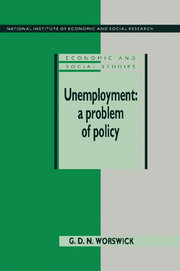Book contents
- Frontmatter
- Contents
- List of tables
- List of charts
- Preface
- 1 INTRODUCTION
- 2 CONCEPTS AND MEASUREMENTS
- PART 1 STRUCTURAL CHANGE
- PART 2 THE WAGE QUESTION
- 8 WAGES AND EMPLOYMENT
- 9 WAGE SUBSIDIES
- 10 PROFIT SHARING
- 11 INCOMES POLICY
- PART 3 MACROECONOMIC POLICY
- PART 4 INTERNATIONAL DIMENSION
- Appendix to Chapter 8: The puzzle of the apparent fall in United States real wages
- Notes
- List of works cited
- Index
- THE NATIONAL INSTITUTE OF ECONOMIC AND SOCIAL RESEARCH PUBLICATIONS IN PRINT
10 - PROFIT SHARING
from PART 2 - THE WAGE QUESTION
Published online by Cambridge University Press: 06 July 2010
- Frontmatter
- Contents
- List of tables
- List of charts
- Preface
- 1 INTRODUCTION
- 2 CONCEPTS AND MEASUREMENTS
- PART 1 STRUCTURAL CHANGE
- PART 2 THE WAGE QUESTION
- 8 WAGES AND EMPLOYMENT
- 9 WAGE SUBSIDIES
- 10 PROFIT SHARING
- 11 INCOMES POLICY
- PART 3 MACROECONOMIC POLICY
- PART 4 INTERNATIONAL DIMENSION
- Appendix to Chapter 8: The puzzle of the apparent fall in United States real wages
- Notes
- List of works cited
- Index
- THE NATIONAL INSTITUTE OF ECONOMIC AND SOCIAL RESEARCH PUBLICATIONS IN PRINT
Summary
INTRODUCTION
The remuneration of workers by a share in the crop, as in agriculture, or in the proceeds from the sale of the product, as in sliding-scale agreements linking wages to product prices, which have been used at one time or another in the coal and steel industries, goes a long way back in the history of capitalism, but the practice was becoming less common in advanced countries in the past half century. However, interest has been revived by the claims made by Weitzman (1984) that profit or revenue sharing would provide a powerful antidote to stagflation, having strongly favourable effects on employment, as well as tending to reduce inflationary pressures. Weitzman's arguments received an initially favourable reception from a number of distinguished economists, but have since failed to find support in historical and empirical studies. We will first set out the essentials of the argument and draw attention to the key assumptions about firms' behaviour which are necessary for the conclusion about stagflation to be realised. Then we consider the results of some recent historical and empirical studies of profit sharing.
THE WAGE SYSTEM AND SHARING
Weitzman contrasts the behaviour of a profit-maximising firm under a wage system, in which workers receive a fixed wage, specified in advance and not tied in any way to the revenue or profit performance of the firm, with a sharing system in which part, at least, of the remuneration is proportional to the revenue or profit of the firm.
- Type
- Chapter
- Information
- Unemployment: A Problem of PolicyAnalysis of British Experience and Prospects, pp. 109 - 117Publisher: Cambridge University PressPrint publication year: 1991

